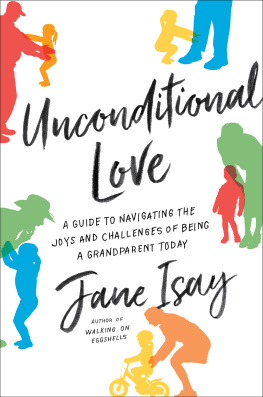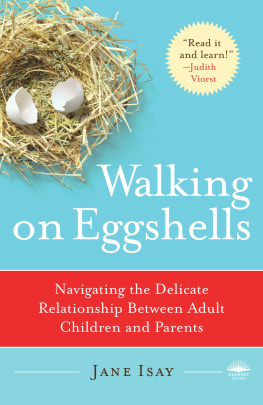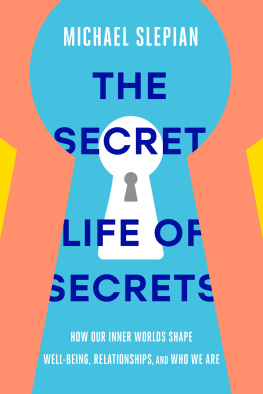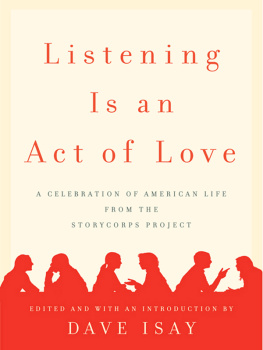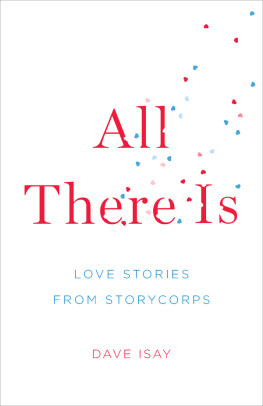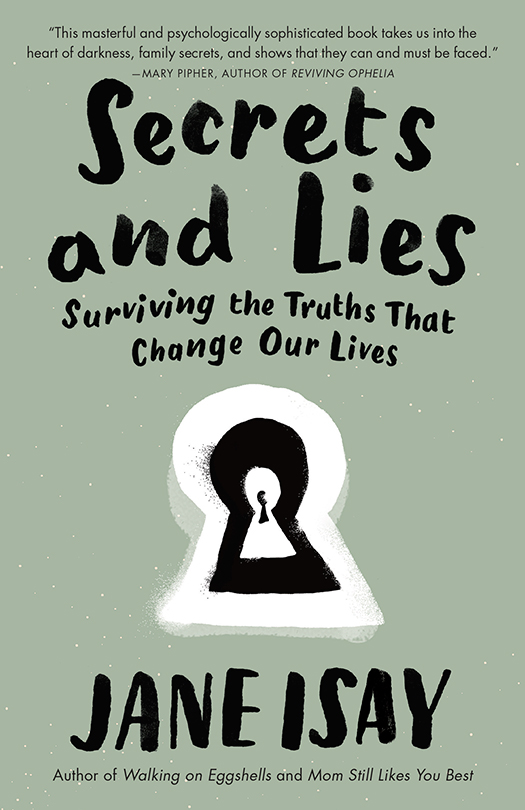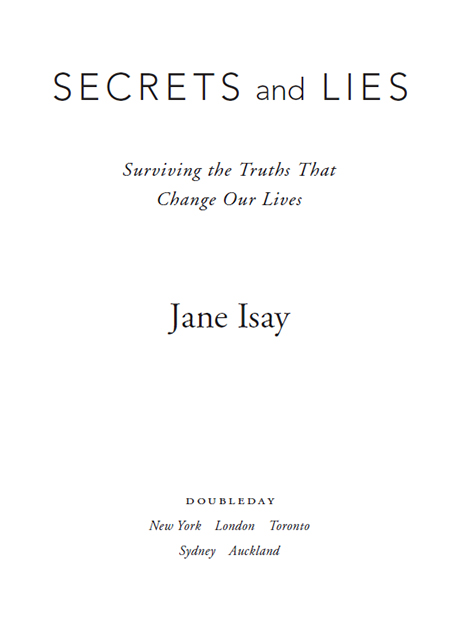
Copyright 2014 by Jane Isay
All rights reserved. Published in the United States by Doubleday, a division of Random House, LLC, New York, and in Canada by Random House of Canada Limited, Toronto, Penguin Random House Companies.
www.doubleday.com
DOUBLEDAY and the portrayal of an anchor with a dolphin are registered trademarks of Random House LLC.
Library of Congress Cataloging-in-Publication Data Isay, Jane.
Secrets and lies : Surviving the truths that change our lives / Jane Isay.
pages cm
1. Gay fathers. 2. Closeted gays. 3. Family secrets.
4. Families. 5. Deception. I. Title.
HQ76.13.I83 2014
306.85dc23
2013018902
ISBN 978-0-385-53414-7
eBook ISBN: 978-0-385-53415-4
Cover design, lettering and illustration by Isabel Urbina Pea
v3.1_r1
For Benjamin, Ruby, Tobey, Mazie
My love for you is no secret
CONTENTS
INTRODUCTION: FINDERS, KEEPERS
The pain of learning a secret and the price of keeping it
This is a book about the secrets that change our lives. When we learn a secret that someone we love has been keeping from us, our sense of reality is shaken. We begin to question our memories, our experiences, and our expectations.
Secrets and Lies delves into the rage and the misery and hopelessness we feel when we learn a secret that has betrayed our trust. Its about the deep and powerful urges we have to maintain the status quo despite the secrets we hold to ourselves. Its about the need we have to stay connected to the people we have wronged by our secrets and the people who have wronged us by hiding the truth from us. Its about our need for honesty and our desire for reconciliation. Its about our mistakes and our desire to make amends. When an important secret is revealed, our world changes. We may ask ourselves: Who am I? Who is this stranger? Why did this happen to me, and why was it hidden? Who can I trust, and what kind of a fool have I been? How can I live my life now that I know the truth?
I have experienced all of these feelings and more, and so have many of the people whose stories you will read in this book. Youll learn about secrets that transform our identity: you were adopted; your father isnt really dead. Youll read stories about secrets that destroy trust: a man discovers that his wife has been sleeping with the teenage babysitter. There are secrets that people have been urged to keep for the sake of the family: a sister died at ten; a father committed suicideit wasnt pneumonia after all.
Discovering that someone you love has lied to you and kept a secret feels like being hit by a bolt of lightning. Such is the circumstance of the Finder, the person to whom the truth is revealed. The arc of his or her life is altered in an instant. Everything that has been planned and expected fades away. Suddenly the present makes no sense and the future is impossible to picture. Why are these revelations so devastating? What difference does a new turn in the plot of our lives make?
As human beings, we live the stories we tell ourselves. This internal narrative makes up the core of our identity. Every day, and in every circumstance, we tell and retell our story. As we encounter new information, the story adjusts a little bit. It is altered as we move through life. Think of our stories as a set of movies. Some are about our originswho we come from and how we were formedso finding out information that changes the story is shocking. For example, learning that you are not your parents child shakes you to the core. Other stories enable us to live our lives as adults. They are about who we love and how we live. When a husband who has been cheating on you for years finally blurts out the truth, your reality is transformed in a flash. Others are about the future. How can you handle a side of the family you never knew existed?
In order to make wise decisions we project a series of scenarios. We mentallyand often unconsciouslyplan and play out events as if we were the stars of our own movie. We make our choices based on our preference for one or another of the scenarios we create. When a secret is revealed, the movies of our lives are shredded. The film has jumped its sprockets. How and when do we reclaim our reality and tell ourselves a new story that is more faithful to the truth? When our reality is fragmented, so are we.
The secret keeper, the person who has a truth so shameful that it must be hidden, is also pained by the difference between reality and appearance. The Keeper will shape her responses to the appearance of things, not to her genuine feelings. The Keeper will become constantly alert in order to keep contradictionsand intimacyat bay. It becomes easy to lie about why you got home late, or who was on the phone. That is the life of the secret keeper. Fragmentation is the rule. Honesty and closeness are the enemy. How can you live with yourself and with people you love while you are keeping a secret about your sister or your child or yourself, and why would you do it?
Is it shame? Is it commitment to the status quo? Is it fear of retribution or rejection?
The Keeper suffers self-doubt and worries about the future.
How can you square the deception with your desire to be a good person? How would your life change if the truth came out?
The Keeper worries about being found out. The Keeper needs to walk fast and talk fast around the truth. Its a hard job. The Keeper also tries to create an internal story that keeps self-judgment at bay, because as human beings we dont like to see ourselves as bad people. So we rationalize, and we explain, and we cover over the bright shiny truth. We tell ourselves stories about how much better off everybody is if they are ignorant. The Keeper is afraid of change, of retribution, and of being judged.
Sometimes events intervene. An anonymous letter appears, or a lost relative turns up at a family funeral. A piece of paper falls out of a wallet, or a secret diary is read for the first time. Sometimes the Keeper can no longer bear the conflict between telling lies and being a person worthy of self-respect. So a confession is made.
Now comes the hard part: to face and reconcile to the new reality. Here both the Finder and the Keeper have choices. Do you tell your adult daughter why you adopted her and kept it a secret? Do you sit through the recriminations that follow the revelation of lies told over decades?
The Finder may dissolve into rage and grief and sever the relationship. The Finder may decide to ignore the truth and move on as if nothing happened. The Finder may struggle and fail to integrate the new truth into the life story. Or the Finder may decide to create a livable reality that includes the truth.
Integrating that new reality and living with it takes work, and people have many ways of accomplishing this, as you will see in the pages that follow.
If the Keeper wants to repair and maintain relationships with the people who have been misled and betrayed, hard work lies ahead, including:
a full confession of all the facts
an explanation of the reasons for the secret
acceptance of responsibility for the betrayal
repentance without rationalization
the patience to rebuild
You may wonder why I write with such conviction about the crises and pain that secrets cause. I have interviewed more than sixty people who have told me stories of the secrets they have carried and the secrets they have learned. But before I even began the interviews, I was already an expert.


